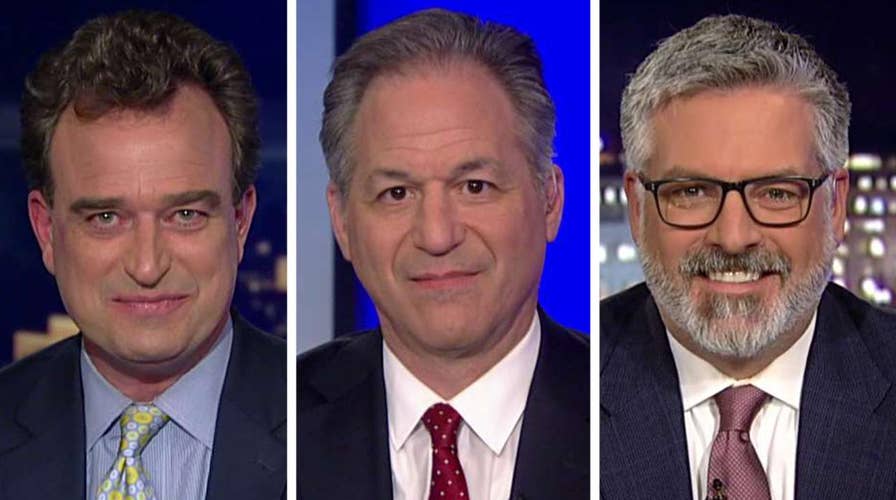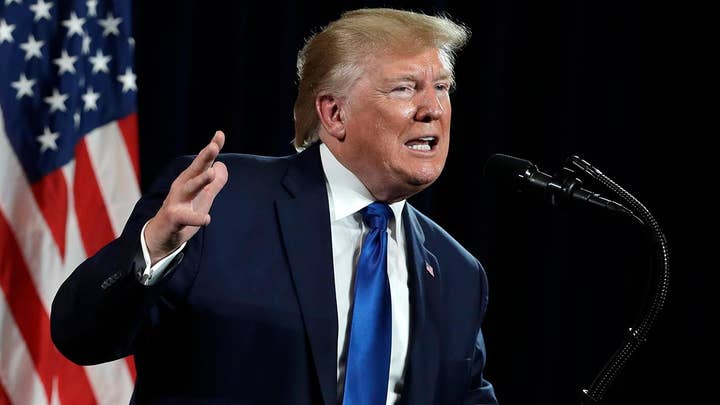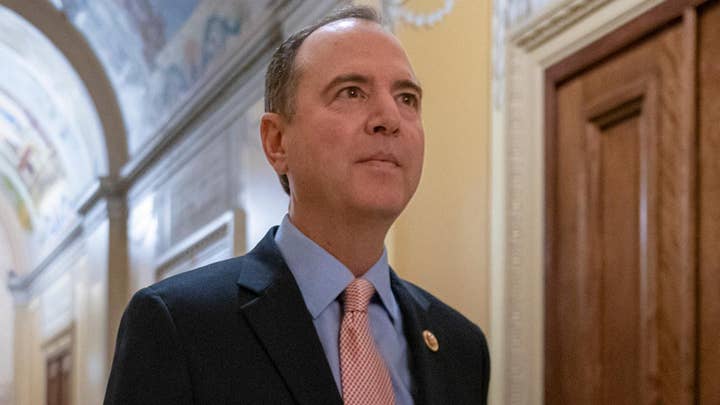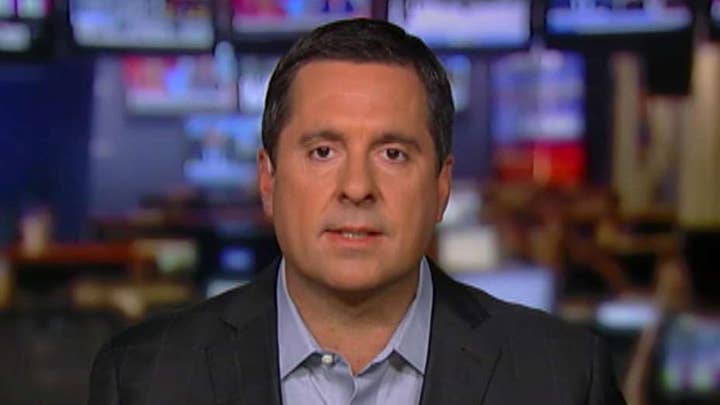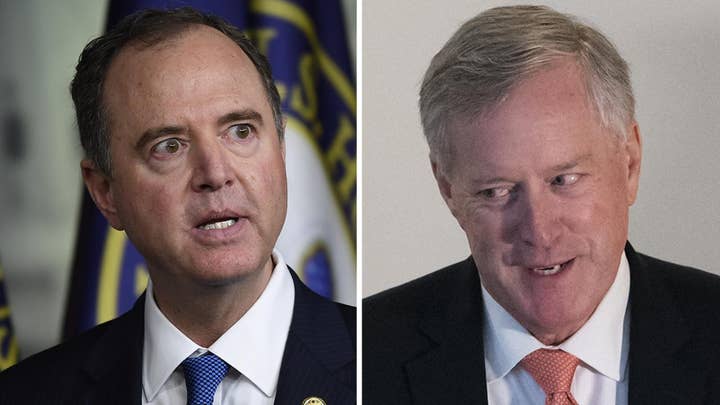What to expect as impeachment inquiry moves into public phase
Washington awaits high-stakes public hearings in impeachment inquiry; reaction and analysis from the 'Special Report' All-Stars.
CAPITOL HILL – We don’t do impeachment hearings very often in Congress. In fact, this session is the first public hearing involving the potential impeachment of a president since November 19, 1998. That’s when the House Judiciary Committee prepared to impeach then-President Clinton.
But, this hearing is before the Intelligence Committee.
Expect at least one round of questions, per side, running a total of 45 minutes apiece, by House Intelligence Committee Chairman Adam Schiff, D-Calif., and then, 45 minutes by Ranking Member Devin Nunes, R-Calif., the top Republican on the panel. During these 45-minute blocks, Schiff and Nunes may defer to their counsels to pose questions.
The Democrats likely will deploy Daniel Goldman and Daniel Noble, both counsels for the Intelligence Committee, during their 45-minute window to ask questions.
Fox News is told on the GOP side, Steve Castor, whom Rep. Jim Jordan, R-Ohio, brought over from the Oversight Committee, will be the counsel to pose questions for the minority.
The witnesses tomorrow: Assistant Deputy Secretary of State George Kent and Acting Ambassador to Ukraine Bill Taylor. They are set to appear on the same panel.
Rank and file members on the committee will pose questions later in five-minute rounds.
The Democrats’ tactics:
In their lines of questioning, Fox News is told the goal is to let the witnesses “tell their story.”
One Democrat involved in the questioning said, “We need to facilitate and stay out of the way.”
Democrats have told Fox News that Taylor had “the best view of the scheme. He is a habitual note-taker. He is your worst nightmare, very prepared.”
Note the use of the word “scheme” as Democrats try to curate their narrative about President Trump.
One source told Fox News the most important line in all of the transcripts so far may have come from Taylor: “Irregular policy channels were running contrary to longstanding goals of U.S. policy,” the diplomat testified.
Democrats will point out that diplomats and governments “trade horses” all the time, asking for “X” in exchange for “Z.” However, the problem, as Democrats see it, was what the “Z” was. Democrats said “Z” was the request to investigate the Bidens in exchange for aid.
Democrats also have been wary of Republicans trying “stunts” and being argumentative in an effort to distract from the Democrats’ case.
“By Act II, I suspect the dancing bears will enter the room,” one Democratic source said. But, GOP sources downplayed the idea of guerilla tactics during the hearing.
What could be the weaknesses in the Democrats’ approach?
They are relying on the testimony of Taylor – who interpreted and perceived what he thought were problems with how Ukraine policy was going down and if there was a quid pro quo. Remember, Taylor wasn’t on the phone call between President Trump and Ukrainian President Volodymyr Zelensky.
“Hearsay puts a lot of people in jail. Eyewitness testimony can be tough. Cops will tell you that,” said one Democratic source about the pros and cons of relying on Taylor as such a pivotal witness. “Taylor’s deducing all of this.”
That would cut both ways for the Democrats.
The Republicans’ tactics:
Republicans will cross-examine Taylor repeatedly over his lack of “first-hand knowledge” about the call and the fact that his information was “second-hand.”
They also will argue there was “no deliverable. No promise to investigate the Bidens. There were no investigations,” one GOP source said.
Republicans have pointed out that the U.S. also delayed assistance for Lebanon and Armenia. The GOP will say that the European Union was not doing its fair share to help root out corruption in Ukraine.
TRUMP 'VENTED' ANGER ABOUT INTELLIGENCE COMMUNITY INSPECTOR GENERAL, SOURCE SAYS
“The Russia invasion of Crimea (in Ukraine) had more to do with Europe than with the U.S.,” one Republican source said.
Republicans will ask Taylor how and why he thought there was a “linkage” and “who told you that.”
They did say they had a problem: “How do you counteract Kent and Taylor when you don’t have a witness to counter them?” asked one Republican source.
Republicans noted that the Democrats, so far, have not accepted any of their witnesses.
Expect Republicans to question the “legitimacy” of the Democrats’ investigation. They will reiterate that aid to Ukraine eventually was released and there was no probe of the Bidens.
+++++++++++++++++++++++++++++++++++++++++++
Things to watch:
- Protests. We’ve not had much of that so far in the impeachment process. That could begin to change tomorrow. That said, Capitol security officials told Fox News they’re not anticipating something organized, ala the confirmation hearings last fall for future Supreme Court Associate Justice Brett Kavanaugh.
- What is the role of Rep. Jim Jordan, R-Ohio? Does it help Republicans to shift him to the Intelligence Committee? Did it make a strategic difference and actually bolster the president’s defense?
- Are there efforts to “distract” and “dilatory tactics” to gum up the process, parliamentary or otherwise?
Other things to watch for:
Why is Ukraine important?
Ukraine was strategically critical to the survival of the Soviet Union. Soviet leader Josef Stalin called it the “breadbasket of Europe.” It was annexed into the USSR before Ukraine gained independence at the end of the Cold War. But, Russian President Vladimir Putin rolled troops into Crimea after the Sochi Olympics in 2014. The U.S. has always viewed Ukraine in the post-cold War era as a bulwark against the rest of Russia and efforts influence the rest of Europe. That’s why former Ukrainian President Petro Poroshenko spoke to a joint meeting of Congress later in 2014, asking for U.S. assistance. The U.S. viewed Ukraine as a proxy to stave off Russian influence in the west.
How did they do?
Evaluate what Democrats and Republicans on the Intelligence Committee told us they were going to do in the hearing and see if they accomplished their goals. Did they get the answers they wanted? Was it a significant moment to sway public opinion? Or, did their maneuvers fall short?
“What did the president know and when did he know it?”
Most major hearings consume hours on end in Congress. They can be dry. But sometimes, one moment distills an entire, historic episode for the ages, via a solitary soundbite. Think of former Senate Majority Leader Howard Baker, R-Tenn., declaring, “What did the president know and when did he know it?” during the Watergate hearings in 1973. Do this week’s hearings produce a soundbite or moment which crystallizes the entire affair – in favor of either the Democrats or the president? That was the problem for Democrats with former Special Counsel Robert Mueller’s hearing over the summer. Little became emblematic of the hearing or the points the Democrats were trying to make. That’s why the Mueller hearing largely fell flat. But, do these week’s hearings capture the attention of the public with a soundbite in the same fashion Baker’s line resonated in 1973?
+++++++++++++++++++++
CLICK HERE TO GET THE FOX NEWS APP
What’s next?
The House Intelligence Committee announced five additional hearings for next week.
On Nov. 19, the panel will hear from Jennifer Williams, an aide to Vice President Mike Pence, and Lieutenant Colonel Alexander Vindman. That same afternoon, the committee has invited former envoy to Ukraine Kurt Volker and National Security Council (NSC) aide Tim Morrison. On Nov. 20, the panel takes testimony from U.S. Ambassador to the European Union Gordon Sondland. The matinee hearing features Pentagon official Laura Cooper and Under Secretary of State for Political Affairs David Hale. And, on Nov. 21, former NSC aide and Russia expert Fiona Hill testifies.








































